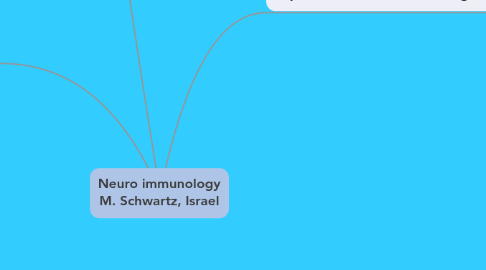
1. proposed: a chronic disease may be dormant long before onset, due to an equilibrium between the cns risk factors and the immune system; onset and progression means loss of equilibrium - insufficient immunity or immune dysfunction
1.1. in ALS or AD we would suggest: anti-inflammatory should be the LAST drugs to use!!
2. Meeting notes by
2.1. Paul de Roos
2.1.1. www.twitter.com/paulderoos
2.1.2. www.paulderoos.com
2.2. Mindmap hosted on
2.2.1. www.neurologytraining.eu
2.2.1.1. Twitter:
2.2.1.1.1. www.twitter.com/trainneurology
2.3. Meeting
2.3.1. Controversies in Neurology
2.3.1.1. Linkt to website
2.3.2. Meeting Overview mindmap
2.3.2.1. Link to mindmap
3. Be careful: Immune cells actived in the brain / spinal cord, does not mean good/bad!
3.1. Diversity of phenotype of immune cells
3.1.1. macrophages can be anti-inflammatory
3.1.2. Immune system also protects brain
3.1.3. Schwartz 1998
3.1.3.1. Alternatively "ex-vivo" activated macrophages (M-2), when injected to the lesion margins, benefit repairs
3.1.3.2. implantation of stimulated homologous macrophages ...
3.1.4. Where do T-cells act?
3.1.4.1. Protective auto immunity
3.1.4.2. Without T-cells not sufficient recovery(!)
3.1.4.3. it's a matter of balance
3.1.4.4. Differentce between systemic and local T cells
3.1.4.5. What's relevance to chronic auto immune disease
3.2. Immune cells support neuronal survival!
3.3. Macrophage heterogeneity and tissue lipids
3.3.1. Siamon Gordon,
3.4. Huge confusion on what anti-inflammatory reactions are good or bad(!)
3.4.1. Shecther PlosMed 2009
3.4.1.1. monocytes can infiltrate to injured spinal cord
3.4.1.2. No monocytes infiltrates to the healthy CNS
3.4.1.2.1. blood derived macrophages are beneficial in the spontaneous recovery from spinal cord injury
3.4.1.3. T cells boost monocyte recruitment
3.4.1.3.1. the monocytes are pivotal for motor function recovery
3.5. What is the role of the blood-borne monocytes
3.5.1. infiltrating blood-derived macrophages are playing an anti-inflammatory role; terminating the microglial response and degrade the glial scar
3.6. Interim summary
3.6.1. nat rev neurosci 2009, ROlls
3.6.2. London et al J exp med 2010
3.6.3. missed some facts
